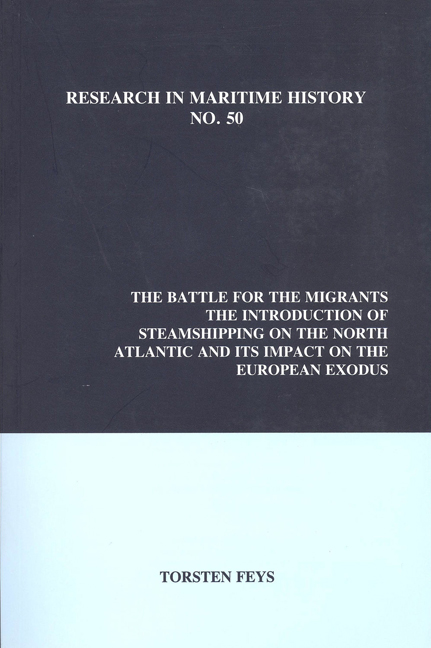 The Battle for the Migrants
The Battle for the Migrants Book contents
- Frontmatter
- Contents
- About the Author
- Acknowledgements
- Figures and Tables
- Introduction
- Part I State Policies and Their Influence on the Connections between Maritime and Migration Networks, 1830-1870
- Part II The Impact of Steam Shipping on Transatlantic Migration, 1870-1914
- Chapter 1 The Role of Middlemen
- Chapter 2 Competition and Collusion: The Growing Pains of Passenger Shipping Conferences
- Chapter 3 The IMM Merger and Further Consolidations in the Shipping Industry
- Chapter 4 The Nationalization of American Migration Policies and the Visible Hand of the Shipping Lobby
- Chapter 5 Shipping Companies' Interference with the Enactment and Implementation of Immigration Laws during the Progressive Era
- Conclusion
- Appendices
Chapter 1 - The Role of Middlemen
from Part II - The Impact of Steam Shipping on Transatlantic Migration, 1870-1914
- Frontmatter
- Contents
- About the Author
- Acknowledgements
- Figures and Tables
- Introduction
- Part I State Policies and Their Influence on the Connections between Maritime and Migration Networks, 1830-1870
- Part II The Impact of Steam Shipping on Transatlantic Migration, 1870-1914
- Chapter 1 The Role of Middlemen
- Chapter 2 Competition and Collusion: The Growing Pains of Passenger Shipping Conferences
- Chapter 3 The IMM Merger and Further Consolidations in the Shipping Industry
- Chapter 4 The Nationalization of American Migration Policies and the Visible Hand of the Shipping Lobby
- Chapter 5 Shipping Companies' Interference with the Enactment and Implementation of Immigration Laws during the Progressive Era
- Conclusion
- Appendices
Summary
As Michael Miller has observed, Atlantic migration only reached a fever pitch as a result of the business networks comprising lodging house owners, local agents, recruiters, labour agencies, migrant brokers and trading, railroad and shipping companies. Yet most migration studies treat the vast networks of migrant agents as parallel entities existing beside chain-migration patterns and having little or no impact on migrant flows. Migrant agents are treated as mere travelling agents, facilitating demographic movements without stimulating them. Such studies, however, neglect the fact that transatlantic migration patterns developed around pre-existing maritime trade routes and networks which reinforced these chains. How passenger liners integrated the widespread preexisting networks of migrant brokers and agents remains unclear. Hartmut Bickelmann and Agnes Bretting suggest that migrant brokers and agents lost their influence when shipping companies gained control of the forwarding business by separating freight and passenger services with the transition from sail to steam. The records of the Holland-America Line (HAL) which employed these agents will shed new light on the working relations during the steamship era.
With the introduction of steam, the American market for ocean passage tickets gained importance as the expanding return, prepaid and remittance markets demonstrate. The concentration of migrants in ethnic communities generated demands for specific products and services, which in turn created opportunities for immigrant entrepreneurs with unique qualifications to fill. Ethnic ties played an important role for newcomers who often found in immigrant entrepreneurs emissaries “to America within America.” Yet despite the important role of ethnicity on the formation and function of the American business community, it has received little attention in business history. Jared Day's cross-ethnic analysis describing the general features of “immigrant bankers” still awaits a detailed investigation. This chapter reassesses the key role of agents in the migration process, connecting the individual migrant to shipping companies. They were the middlemen working on what Dirk Hoerder labelled the “meso-level,” mediating networks and linking individuals to world systems. To understand these middlemen, we first need to look at the debate about their impact in the migration and maritime literature.
- Type
- Chapter
- Information
- The Battle for the MigrantsThe Introduction Of Steamshipping On The North Atlantic And Its Impact On The European Exodus, pp. 71 - 118Publisher: Liverpool University PressPrint publication year: 2012


